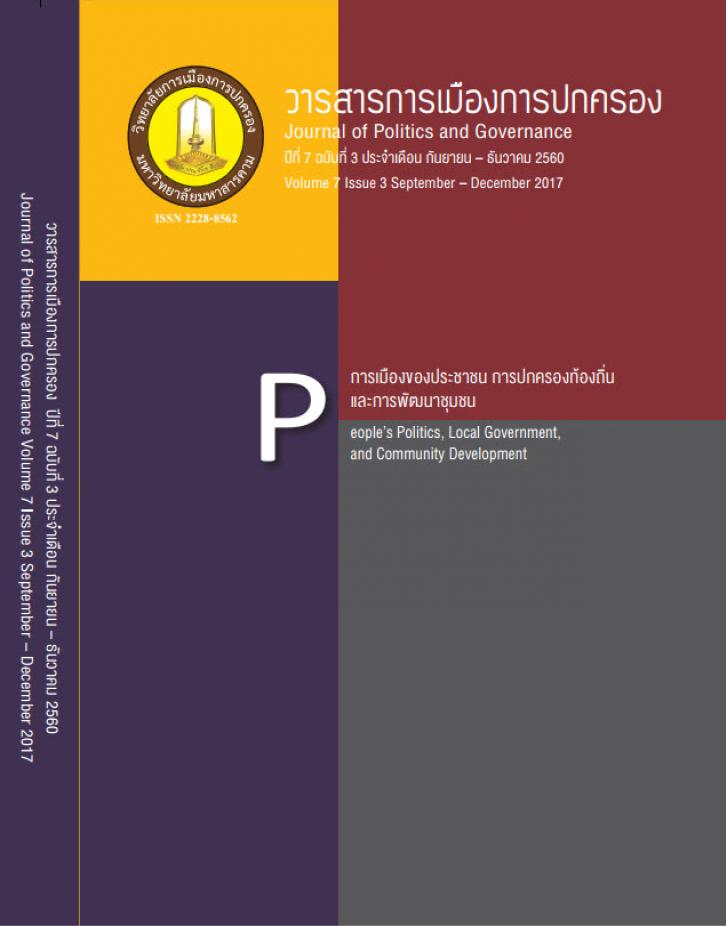การพัฒนาหลักสูตร การปลูกผักปลอดสารพิษเพื่อส่งเสริมความมั่นคง ด้านอาหารปลอดภัยสำหรับชุมชนภายใต้ความร่วมมือของภาคีการพัฒนา
Main Article Content
บทคัดย่อ
การวิจัยเชิงปฏิบัติการนี้มีวัตถุประสงค์เพื่อพัฒนา และศึกษาผลของหลักสูตร การปลูกผักปลอดสารพิษ เพื่อส่งเสริมความมั่นคงด้านอาหารปลอดภัยสำหรับชุมชนภายใต้ความร่วมมือของภาคีการพัฒนา กระบวนการวิจัยมี 3 ขั้นตอน ได้แก่ ขั้นตอนที่ 1 การวางแผน (Plan) ค้นหาพันธมิตร ประสานเครือข่ายภาคีและพัฒนาหลักสูตรการปลูกผักปลอดสารพิษขั้นตอนที่ 2 ปฏิบัติการแบบมีส่วนร่วม (Action and Observe) จัดอบรม ประเมินและติดตามผลการจัดอบรม และขั้นตอนที่ 3 สะท้อนผลวิจัย (Reflex)การเก็บรวบรวมข้อมูลใช้ทั้งวิธีการเชิงคุณภาพด้วยการสัมภาษณ์เชิงลึกกับกลุ่มผู้ให้ข้อมูลหลัก การวิเคราะห์เอกสาร การสำรวจพื้นที่แปลงเกษตรกร และเชิงปริมาณโดยใช้แบบสอบถาม แบบทดสอบก่อนและหลังการจัดกิจกรรม แบบสอบถามความพึงพอใจ กับผู้เข้าร่วมอบรม ได้แก่ เกษตรกรในพื้นที่ตำบลทุ่งบัว และนักศึกษาจากวิทยาลัยเกษตรและเทคโนโลยีสิงห์บุรี จำนวน 40 คน หลังเสร็จสิ้นกิจกรรมได้จัดเวทีสรุปและสะท้อนผลการวิจัยกับภาคีการพัฒนา วิเคราะห์ข้อมูลโดยใช้สถิติ ได้แก่ ร้อยละ ค่าเฉลี่ย ค่าเบี่ยงเบนมาตรฐาน t-test และการวิเคราะห์เนื้อหา ผลการวิจัย พบว่า การพัฒนาหลักสูตรภายใต้ความร่วมมือ โดยหลักสูตรประกอบด้วยวัตถุประสงค์ สาระสำคัญได้แก่ 1) กระบวนการปลูกผักอินทรีย์และผักปลอดสารพิษ 2) การขอรับรองมาตรฐาน และ 3) กลไกการสร้างการตลาดและเครือข่ายเทคนิคการจัดกิจกรรมการเรียนรู้ใช้รูปแบบการฝึกอบรมเชิงปฏิบัติการที่เน้นการแลกเปลี่ยนเรียนรู้และลงมือปฏิบัติงานจริง สื่อและแหล่งเรียนรู้และการประเมินผลและติดตามผลผลการจัดอบรม พบว่า ความรู้เกี่ยวกับกระบวนการปลูกเกษตรอินทรีย์ และเกษตรปลอดภัยของเกษตรกรหลังเข้าร่วมอบรมสูงกว่าก่อนอบรมอย่างมีนัยสำคัญทางสถิติที่ระดับ .05 และเกษตรกรมีความพึงพอใจต่อการจัดการอบรมโดยภาพรวมในระดับมากที่สุดและจากการติดตามประเมินผลหลังการอบรม พบว่า เกษตรกรสามารถนำเอาความรู้และประสบการณ์ที่ได้รับไปปฏิบัติการปลูกผักในพื้นที่ของตนเองได้ การสะท้อนคิด พบว่า การมีส่วนร่วมและกำหนดบทบาทของภาคส่วนต่างๆ ในการส่งเสริมการปลูกผักปลอดสารพิษ เพื่อสร้างความมั่นคงทางด้านอาหารของชุมชนเป็นสิ่งที่จำเป็น เนื่องจากจะทำให้ได้ข้อมูลที่ครบถ้วน และการสนับสนุนที่ชัดเจน
Article Details
เอกสารอ้างอิง
_________. (2558). ทิศทางของแผนพัฒนาเศรษฐกิจและสังคมแห่งชาติฉบับที่ 12. กรุงเทพฯ: สำนักงานคณะกรรมการการพัฒนาเศรษฐกิจและสังคมแห่งชาติ.นนทกานต์ จันทร์อ่อน. (2557). ความมั่นคงทางอาหารของประเทศไทย (Thailand Food Security).
กรุงเทพมหานคร:สำนักวิชาการ สำนักงานเลขาธิการวุฒิสภา.
เปรม ณ สงขลา. (2555). เอฟเอโอเพิ่งตื่นเน้นเรื่องสหกรณ์การเกษตรเพื่อช่วยผู้หิวโหย. เข้าถึงเมื่อวันที่ 1 กุมภาพันธุ์ 2559 จาก http://www.kehakaset.com/index.php/ component/content/article/79-information/1022-fao.
พัทธ์ธีรา รื่นพิทักษ์. (2557). ภาพฉายแห่งอนาคตของไทย ฝ่าวิกฤตการณ์อาหารโลก. เข้าถึงเมื่อวันที่ 1 กุมภาพันธ์ 2559 จาก http://www.oie.go.th/sites/default/files/attachments/article/semi-WorldFoodCrisis.pdf.
ยงยุทธ์ ศรีเกี่ยวฟั่น และคณะ. (2555). การส่งเสริมการทำเกษตรอินทรีย์และการบริหารจัดการศัตรูพืชโดยวิธีผสมผสานของเกษตรกรในอำเภอสันทราย จังหวัดเชียงใหม่. เชียงใหม่: มหาวิทยาลัยแม่โจ้.
สันติ ศรีสวนแตง ประสงค์ ตันพิชัย อภิชาติ ใจอารีย์ และคณะ. (2557). รายงานวิจัยฉบับสมบูรณ์
การศึกษาแนวทางการพัฒนาทรัพยากรมนุษย์เพื่อประกอบอาชีพเกษตรกรรม. กรุงเทพมหานคร: สำนักงานกองทุนสนับสนุนการวิจัย (สกว.).
สุรชัย รักษาชาติ. (2545). ความมั่นคงทางอาหารในระดับครัวเรือนของคนชายขอบ: รูปแบบการบริโภคและแหล่งที่มาของอาหารของครัวเรือนกะเหรี่ยงภาคตะวันตก ประเทศไทย. วิทยานิพนธ์ปริญญาวิทยาศาสตรมหาบัณฑิต สาขาวิชาเทคโนโลยีการวางแผนสิ่งแวดล้อมเพื่อพัฒนาชนบท, มหาวิทยาลัยมหิดล.
สมพร อิศวิลานนท์. (2557). ภาวะคุกคามการเกษตรและความมั่นคงอาหารและทางออก. การบรรยายพิเศษในเวที “พลังชุมชนท้องถิ่นร่วมสร้างนวัตกรรมการจัดการสุขภาวะโดยเอาพื้นที่เป็นตัวตั้ง” ในวันที่ 2 มีนาคม 2557 ณ ศูนย์การประชุมไบเทค บางนา กรุงเทพฯ. เข้าถึงเมื่อวันที่ 1 กุมภาพันธ์ 2559 จาก https://lams4research.files.wordpress.comf.
สำนักงานโครงการพัฒนาแห่งสหประชาชาติ ประจำประเทศไทย. (2552). ความมั่นคงของมนุษย์ ในปัจจุบันและอนาคต. เข้าถึงเมื่อวันที่ 1 กุมภาพันธ์ 2559 จาก http://km.nmt.or.th.
อภิชาติ ใจอารีย์. (2559). กระบวนการมีส่วนร่วมแบบพหุภาคีเพื่อการจัดการสิ่งแวดล้อมอย่างยั่งยืน: กรณีศึกษาการจัดการป่าชุมชนบ้านพุเตย จังหวัดกาญจนบุรี. วารสารมหาวิทยาลัยศิลปากร ปีที่ 36(1), 111-136.
อภิชาติพงษ์ ศรีหดุลชัย, ศรัณย์ วรรธนัจฉริยาเดชา ศุภวันต์ และ สุภาวดี โพธิยะราช. (2557). ความมั่นคงทางอาหารและพลังงานของไทย . เข้าถึงเมื่อวันที่ 1 กุมภาพันธ์ 2559 จาก http://www.itd.or.th/ research-report.


